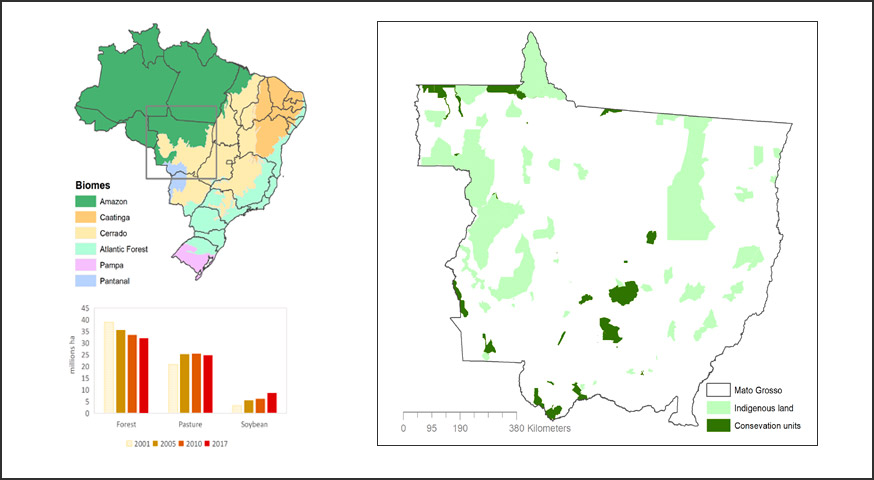Impacts of Public and Private Sector Policies on Soybean and Pasture Expansion in Mato Grosso—Brazil from 2001 to 2017
by Michelle C. A. Picoli 1, Ana Rorato 1, Pedro Leitão 2,3, Gilberto Camara 1,4, Adeline Maciel 1, Patrick Hostert 3,5 and Ieda Del’Arco Sanches 1
1National Institute for Space Research (INPE), São José dos Campos 12227-010, Brazil
2Department Landscape Ecology and Environmental Systems Analysis, Technisches Universität Braunschweig, 38106 Braunschweig, Germany
3Geography Department, Humboldt-Universität zu Berlin, 12489 Berlin, Germany
4Group on Earth Observations (GEO), CH-1211 Geneva, Switzerland
5Humboldt-Universität zu Berlin, Integrative Research Institute on Transformations of Human-Environment Systems (IRI THESys), 10117 Berlin, Germany
Land 2020, 9(1), 20; https://doi.org/10.3390/land9010020
Publisher: mdpi | Published: 13 January 2020
Abstract
Demand for agricultural exports in Brazil has stimulated the expansion of crop production and cattle raising, which has caused environmental impacts. In response, Brazil developed public policies such as the new Forest Code (FC) and supply chain arrangements such the Soy and the Cattle Moratoriums. This paper analyzes the effectiveness of these policies, considering the trajectories of agricultural expansion in the state of Mato Grosso in three years: 2005 (pre-moratorium and before the new FC), 2010 (post-moratorium and before the new FC) and 2017 (post-moratorium and post-new FC). Our analysis uses a detailed land use change data for both the Amazon and Cerrado biomes in Mato Grosso. In all the years considered, soybean expansion occurred in consolidated production areas and by conversion of pastures. Pasture expansion is influenced by existence of pastures nearby, by areas of secondary vegetation and deforestation. Our data and models show the effectiveness of public policies and private arrangements to reduce direct conversion from forests to crop production. However, our results also provide evidence that soybean expansion has caused indirect impacts by replacing pasture areas and causing pasture expansion elsewhere. Evidence from our work indicates that Brazil needs broader-ranging land use policies than what was done in the 2010s to be able to reach the land use goals stated in its Nationally Determined Contribution (NDC) to the Paris Agreement. View Full-Text
Keywords: Soy Moratorium; Cattle Moratorium; public policy; spatial regression analysis
© This is an open access article distributed under the Creative Commons Attribution License which permits unrestricted use, distribution, and reproduction in any medium, provided the original work is properly cited


